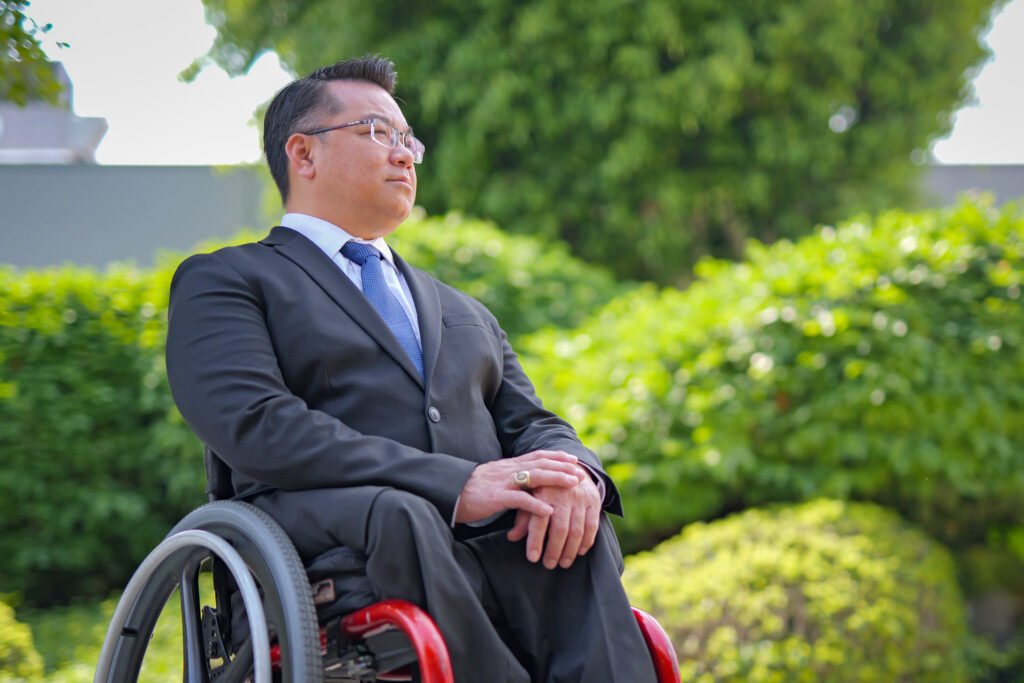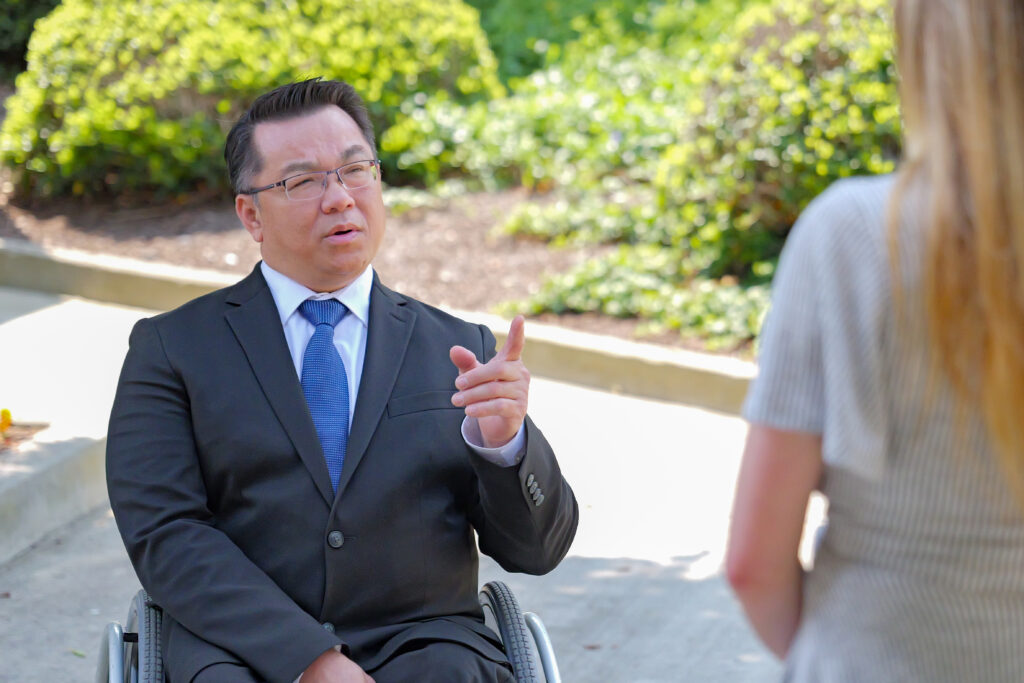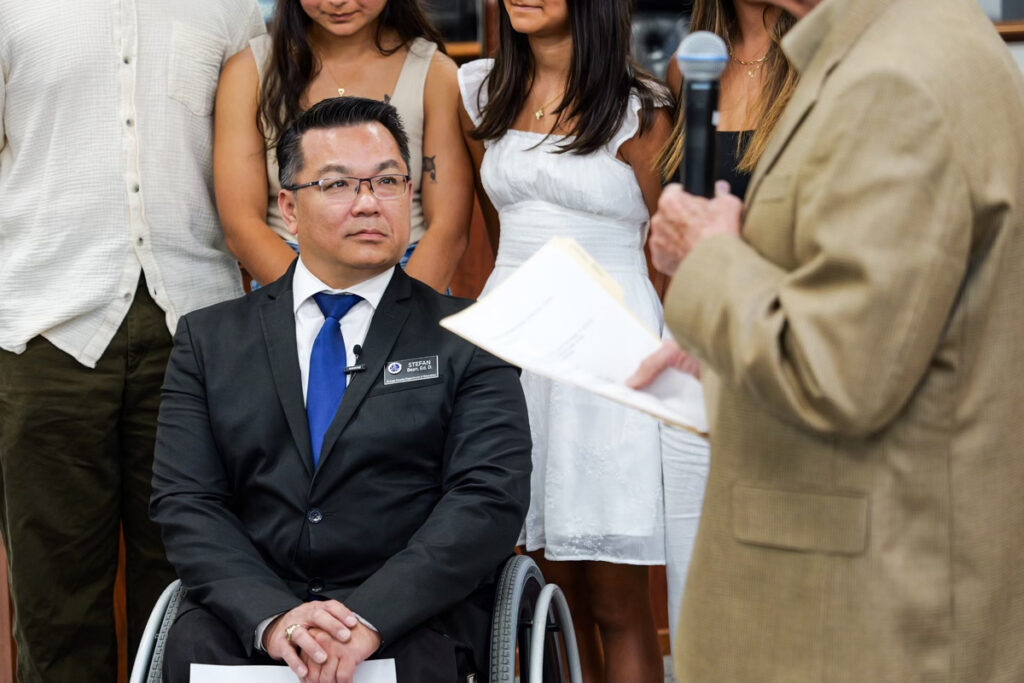
Dr. Stefan Bean’s journey to becoming Orange County’s superintendent of schools reads like a movie script, a cinematic tale of resilience and odds overcome. But, as he notes, it’s really a testament to the importance of community.
Born in Saigon during the Vietnam War, his early years were defined by adversity. After contracting polio at age 2, leaving him paralyzed from the waist down, he was abandoned by his biological parents and discovered alone on the city’s war-torn streets. Then came a lifeline in the form of Operation Babylift, a humanitarian program that connected Vietnamese orphans with adoptive families in the United States.
The veteran educator still holds vague memories of April 6, 1975, the day he was mistakenly directed onto the wrong U.S.-bound plane. He would later learn that the aircraft that was supposed to be his transport crashed just 12 minutes after takeoff, killing all but eight orphaned children on board.
In America, Bean found safety, a home and community. Looking back, he underscores the compassion of the family that fostered him — and ultimately adopted him. He’s grateful for his sixth-grade teacher, who nurtured his potential as a public speaker and became a lifelong friend. He fondly recalls how four high school friends used to lift his wheelchair and carry him to his second-story classroom each day. And he praises fellow parishioners who rallied around him as his wife, Janet, battled cancer.
“Through these experiences, I’ve learned that overcoming adversity is very much about the community and support network around you,” he says, “from those friends who carried me up the stairs to the church community that supported us during my wife’s illness, and educators like Mr. Geisinger and Bonnie Geisinger who guided my educational path.”
That path turned into a 25-year career with various stops along the way, including Aspire Public Schools in Los Angeles, where he rose to oversee 11 campuses, and the Irvine International Academy, where he served as executive director. And now it’s led him to the Orange County Department of Education, which, in addition to serving the most vulnerable student populations, supports 28 local districts with programs and services that are critical to their operations.
Bean, a resident of Garden Grove who was appointed as county superintendent by the Orange County Board of Education in June, recently sat down with the OCDE Newsroom to talk about facing adversity, his first impressions of the job, his interests outside of work and his vision for empowering the students of Orange County.
***
What are your impressions of the job so far?
It’s been like drinking from a fire hose — actually, make that two fire hoses. The pace and volume of new information have been intense, but I’ve thoroughly enjoyed my first weeks in the department. It already feels like I’ve been here three months, given all I’ve learned about the incredible work we do.
I’m excited about continuing our efforts and have already had the chance to meet with district superintendents who are eager to see us keep supporting them. Education is a complex system and there aren’t always simple answers, but taking on challenges and finding solutions together brings me great joy, especially when seeing the engagement from others.
I recently joined OCDE’s Educational Services division for their quarterly celebration, and the warm welcome I received was truly amazing. There’s a strong sense of longevity and commitment among the staff here, which speaks volumes about the department’s culture. As a new leader, I’m committed to enhancing and building on this foundation. You’ll find me out there, face to face with our community every day, actively participating and not just behind a door.
How would you describe your vision for OCDE and education in Orange County?
Throughout my career, I have always felt a deep connection to the needs of students, particularly through my personal experiences as an English language learner and a student with a disability. My vision for Orange County schools is founded on the principle of unleashing every student’s potential through an inclusive and rigorous education.
This approach is rooted in empathy and emphasizes the importance of 21st-century competencies, including STEAM — science, technology, engineering, the arts and mathematics — which are critical for navigating and thriving in a complex, global society. By integrating these elements, we want to prepare our students not just for academic success but also to become resilient and innovative leaders.
Have you already set goals for the 2024-25 school year?
My primary goal for the next year is to continue evaluating the strengths and assets we have at the Orange County Department of Education. OCDE has been a highly impactful part of our community for over a hundred years. As I visit different areas, I see the positive effects of our work. My objective is to continue the partnerships and programs that benefit the students in Orange County, and also find ways to extend these benefits across the state. These programs can have far-reaching positive benefits to educational environments in other counties and even beyond.
Broadly speaking, I want to uplift programs that are truly beneficial for our students. So for the next year, it is really about engaging in those relationships, leaning into them and developing new partnerships. I will also work with ACCESS to ensure that our school district — we consider it the 29th district — is the best it can be.
My focus will be on really engaging with the community, both internally and externally, and working with the Orange County Board of Education to ensure all partners are informed. We will prioritize transparency, collaboration and inclusiveness in all our efforts.
Speaking of inclusive, you come from a large family with biological, adopted and foster siblings. How did that influence your life and career?
In our household, I grew up with a total of 11 siblings — two were natural children of my adoptive parents and the rest of us were adopted, many from foster care backgrounds. Over the years, our home became a sanctuary for over 150 foster children, reflecting a wide spectrum of needs and challenges, from cerebral palsy to autism. Ten were permanently adopted into our family. Tragically, one child who was adopted had suffered from severe injuries at the hands of his biological parents, and he passed away at 2 years old. We called him Baby Arthur.

Growing up in a large and diverse family fundamentally shaped who I am today. My mother showed endless warmth and compassion, especially for the most vulnerable, and my father, a sixth-grade teacher, supported our family on a single salary. He instilled in us the importance of education as a means to overcome any challenges.
That combination of my mother’s care and my father’s emphasis on education not only shaped my view of the world but also molded me into the educator and person I am today. These foundational experiences deeply influenced my commitment to support and empower every student in our educational system.
What do you see as the biggest challenges in education today?
Beyond the immediate challenge of learning recovery post-pandemic, I think we need to take a more philosophical approach to how we view education. We should examine models that have proven successful globally — those that cultivate and nurture students’ interests from an early age and integrate real-world learning through apprenticeships and mentorships.
Lately, I’ve observed many competing approaches in education, which sometimes lead us to take sides unnecessarily. If we focus on the basics — teaching solid content and critical thinking — we can re-engage students in learning. As students develop genuine interests in their studies, they become more engaged, which naturally enhances their learning outcomes and sets them on pathways to college, careers and beyond.
However, one of the overarching challenges we face nationally is the polarization within education. It has become a field divided, which detracts from our core mission — what’s best for our students. If we can return to that focus, fostering a genuine interest in learning rather than contention, we’re not just educating; we’re preparing the next generation of leaders, from astronauts going to Mars to future Supreme Court justices and presidents. Our goal in Orange County is to nurture these potentials by focusing on what truly enriches students’ educational experiences.
What leadership principles do you believe are essential for effective governance?
As I’ve emphasized, emotional intelligence is critical in leadership. But it’s also paramount that we engage the people most affected by our decisions in the decision-making process itself. This involvement ensures that our actions are not just based on data or assumptions but are directly informed by the needs and insights of those impacted.
Engaging our partners in these conversations helps us to understand their perspectives, turning these dialogues into one of the most valuable data sets we have. This approach will guide my tenure as superintendent, ensuring that our work is deeply aligned with the community’s needs.
What excites you about this work and this role?
What truly excites me is the opportunity to come to work every day and see hundreds of dedicated individuals who are making a profound difference in students’ lives. These are figures who in some ways remind me of my own father or my longtime friend and sixth-grade teacher Donald Geisinger, who was so influential that I had him swear me in.
Seeing the hard work and pure hearts of those at the Orange County Department of Education, who dedicate themselves to serving our students, energizes me every day. I’m excited by the impact we have, not just within our schools, but across districts and statewide. It’s these connections and the visible results in our students’ achievements that make this role so fulfilling.
Given your extensive experience with charter schools, have there been questions or concerns about how their support will be balanced relative to other educational priorities?
As the county superintendent, I have made it clear that my primary focus is supporting the over 450,000 students across our 28 school districts, along with OCDE’s ACCESS and Connections schools, which together serve as the 29th district. I’ve enjoyed my experience with charter schools, which are public schools, and that work taught me a great deal about innovation. However, I am in a new role now. I am responsible for serving all students, and that is my commitment.
I am fortunate that my educational background spans multiple instructional and school approaches, providing a broad perspective. I believe having experience in both traditional and charter schools is an added advantage, enriching my ability to effectively support all students, schools and programs within our system.
Can you share some of your hobbies and interests? What TV shows are you binging and what movies do you enjoy?
Absolutely. Along with spending time with my children, I’m an avid fan of USC football, and I enjoy playing chess and participating in Texas Hold ’em tournaments when I get the chance. As for TV and movies, I’m a big fan of Star Trek — all of the films and series, really. While I like Star Wars, Star Trek is definitely my favorite.
One show that holds a special place right now is “Modern Family.” We recently finished binge-watching it as a family, and it was just a great way to share laughs and spend time together.
As for movies, I spent the last spring break watching the entire Lord of the Rings series — all of it, which was fantastic.
You’ve overcome some major obstacles in your life to become county superintendent. What advice do you have for others who are facing challenges?
It’s true that my life has presented a series of challenges — from arriving in the United States as an orphan who spoke no English, to navigating the educational system as a student with a disability and an English language learner. There was even the logistical challenge of my high school classrooms being upstairs without elevator access. Every morning, four of my friends would lift my wheelchair and carry me up those stairs. And then, of course, there was the profound struggle of supporting my wife through her battle with cancer, and then losing her, the mother of my four children and the love of my life.

Through these experiences, I’ve learned that overcoming adversity is very much about the community and support network around you — from those friends who carried me up the stairs to the church community that supported us during my wife’s illness, and educators like Mr. Geisinger and Bonnie Geisinger who guided my educational path. It’s the people around us who rally to help us overcome obstacles. This understanding shapes my approach to education.
In Orange County, we will support our students through whatever challenges they face, knowing that some may face more than others. By doing this, we’re not just educating, we’re building the next generation of community leaders — perhaps even the next county superintendent of schools.
